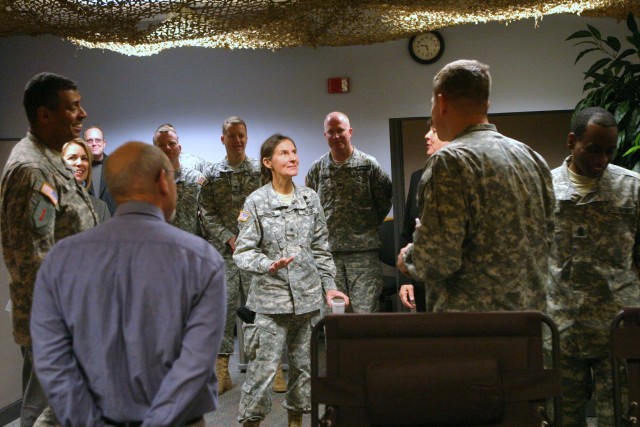FORT RILEY, Kan. - Brig. Gen. Rhonda Cornum, Army Comprehensive Soldier Fitness director, visited Fort Riley Jan. 28 to assist leaders in opening the post's new resiliency campus during a ribbon-cutting ceremony at the Resiliency Learning Center on Custer Hill.
The center, in Building 7285, is the headquarters of Fort Riley's resiliency campus and will provide Soldiers, Families, civilians and retirees the classes and guidance needed to achieve the five pillars of CSF, which are social, emotional, physical, spiritual and Family.
"I look at resiliency training as a preparation for life. The skills you learn, whether it is stress management or communication, those are skills that are equally useful whether you are dealing with the problem of a medical diagnose or losing your job," Cornum said. "It's beautiful and I think it's probably No. 1."
Though doctors play an important role in the health and wellness of Soldiers, she said, most people just need some assistance with learning the appropriate and best techniques with dealing with challenges in their lives.
She said the initiative Fort Riley has taken to create a campus shows "an enormous commitment on the part of the entire headquarters of this division and everybody in it to strengthening the Army."
"Our vision is people who are physically fit, emotionally strong and mentally tough, and it is a commitment to doing that, not just waiting in some reactive mode until somebody has a crisis or problem," she said.
Though she's toured a number of resiliency campuses, Cornum said Fort Riley's is well thought out and going to be a success with the synchronization of the community and military resources. She also said Fort Riley's campus has some advantages over other campuses because of the linkage with Kansas State University, Manhattan, Kan.
"I wish we would have had a Resiliency Learning Center back when I was in Vietnam. It would have saved a lot of lives," said Garrison Chaplain Lt. Col. Edwin Ahl during a prayer breakfast at Army Community Service before the ribbon-cutting ceremony.
A veteran of the Vietnam War, Desert Storm and Operation Iraqi Freedom, Ahl said it is important to work together in the face of adversity.
"Putting together this center is going to be a good thing because we're going to help these Soldiers and their Family members. We're going to reach out to make units better," he said.
Col. Kevin Brown, garrison commander, said the five pillars aren't just for Soldiers and can be applied to government employees, contractors and Family members.
"We're going to take care of our Soldiers, Families, civilians and retirees and the Families of our fallen warriors," he said.
Nearly $250,000 was donated to renovate the building, and more than $3 million will be appropriated for future construction to fulfill the Family component of CSF through the Directorate of Family and Morale, Welfare and Recreation.
"Resiliency is the ability to thrive in the face of challenge and bounce back from adversity and that's what we're all here to do," Brown said.
Maj. Gen. Vincent Brooks, 1st Infantry Division and Fort Riley commanding general, said the approach the post is taking with CSF is to make everyone on post stronger.
"The Army's motto is "Army Strong," but the idea of what makes you strong is the approach that we are taking to comprehensive fitness and it applies to more than Soldiers. Our effort here is going to be broad. We want everyone here to get stronger," he said.
Brooks used the Resilient Spouse Academy, a program that is part of the new campus, as an example of a way the post is making Army Families stronger.
"We've seen this work, and we're not waiting. We're moving out on it. We're leading the way for the Army. I want you to make use of the program. Use this resource. I know that it's working, that it's helping our Soldiers, and I want us to take advantage of that," he said.
Brooks said the idea of the campus is not to wait for someone to be injured but to strengthen them from the start to make them stronger.
"When the challenge comes, and it surely will - life brings challenges, military life brings extra challenges -they will be ready to bounce back and grow from the challenges," he said.
Four other resiliency campuses exist - three in Iraq and one in Kuwait - that have the "Big Red One" touch on them he said.
Capt. Joshua Mantz, aide-de-camp to Brig. Gen. David Petersen, 1st Inf. Div. and Fort Riley commanding general-rear, said the new center will give Families, Soldiers, civilians and retirees a one-stop shop to become stronger.
"The concept of the campus is important because it allows our leaders to know where to go for help and where to send their Soldiers or employees for help. It consolidates the resources we already have," Mantz said.
Cornum and post leaders continued their tour of the campus with stops throughout post including the Army Substance Abuse Program, Craig Fitness Center, Outdoor Chapel, Survivor Outreach Services Center, King Field House, Riley's Conference Center for the Women's Conference, the ACS Annex for the RSA graduation and Irwin Army Community Hospital to speak with leaders on how the hospital supports resiliency.


Social Sharing